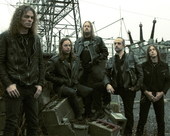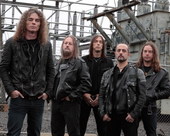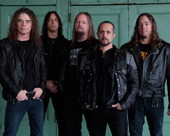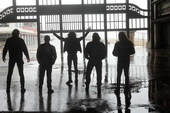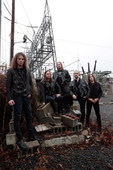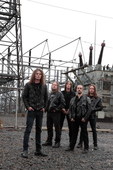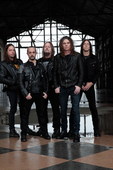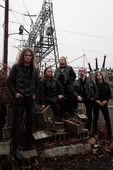Overkill
21st Century Thrash
31.07.2012
Архив интервью | Русская версияThrash metal veterans Overkill are experiencing yet another peak of their creativity – their output is nothing short of excellent for the third time in a row! On the interview side, frontman Bobby “Blitz” Ellsworth easily matches the energy level of “The Electric Age” –there is some sort of elation in his voice, as though he is very anxious to share the regained joy of creation that can be felt in the band’s latest efforts. In our conversation, Bobby turned out to be the same person that he portrays in his lyrics – an honest, straight-forward and ironic man who is open to questions about both the new record and the days long past…
Let’s start our interview with some obvious questions about the new album: when did you start to work on it? How long did it take to record it?
The process of making a record takes approximately eight months, and that goes from arranging songs to everybody tracking demos, then going back to the studio to record everything, then doing the mix, etc. But the riffs are always collected before that eight-month process, DD Verni (bass) is the one who writes the riffs, who starts the songs and in many cases finishes them. I get them at the point when the music is finished, and then I finish my end with melodies and lyrics. So it took us about eight months for the whole thing. We actually started doing drum tracks last June, and they were done in July, so we’d done a long period of time with this. DD also has his own studio, and we used his studio, so we have the luxury of time, it’s not that we have to get it done in a 30-day period, we use as much time as possible for our own satisfaction with regard to the release.
Your previous album “Ironbound” (2010) got such a big critical acclaim. Did it put any pressure on the band when you were working on “The Electric Age”?
No, not really. In a way, we’ve been doing this too long to feel pressure. You do this because you love doing it, and if you do this for this amount of time, you’re either crazy or in love with doing it, and obviously the second point matters for us. Releases like “Ironbound” and “The Electric Age” still have a very contemporary, today feel about it. When we released “Ironbound”, one of the things I said about it was, “What’s important for Overkill is to be viable today, not viable yesterday”. I think “Ironbound” can prove that. I also think “The Electric Age” can prove that, it doesn’t sound to me as if it’s old guys playing old music, it sounds to me as if it’s honest pure energy coming across and getting the best possible recording of this. That makes it viable in 2012, not 1989.
“The Electric Age” was mixed by Greg Reely. Why did you pick him? Why did you decide not to continue with Peter Tagtgren?
We’d secured Peter for it early on. As early as last spring we got in touch with him, and he said he would do it. As we were assembling the record, he got to us and said, “I can’t do it”. We didn’t go into why he can’t do it, we just said, “If he can’t do it, he can’t do it, we just have to go to someone else”. We always liked Greg’s work with Fear Factory, his Machine Head stuff. Obviously we are a different band, and we were not looking to emulate their sound, to copy them, we were looking for somebody who understands that relationship between the drums and guitars. It’s not a hard band to fit the vocals in, because where my voice fits what the frequencies are, so we need somebody who really understands drums and guitars. Greg is a drummer, and that’s one of the great things about working him - the guy who mixes and who is a drummer makes you really tight as musicians. I think it shows on the record, he got a fantastic drum sound and fantastic relationship between the drums and guitars. He made the guitars even thicker than they were on the “Ironbound” record, which I was really impressed with. This record sounds bigger and, in my opinion, with the right production and mix, than the last record did.
How can you explain the meaning of the title “The Elecrtic Age”? What is the message behind it?
We were looking for something that encompassed a period of time. We were heading towards “electric”, meaning that there was something that was always electric, that had always sparked our energy, that had always sparked your energy. But did it just do it now, or has it always done it? And “age” to us felt as a longer period of time, viable today as it was then, and this made it feel bigger. What sparked this specific title was that I came up with a song title called “Electrocution Therapy”, I sent that title to DD, we were going back and forth about an album title, and before I knew it, I was looking at my computer, and I got an e-mail from him saying “The Electric Age”, and I responded to him, “Thumbs up!” It seemed to do what we wanted to do, or display how we wanted to be displayed.
The new album includes the song “21st Century Man”. In your opinion, what kind of man is this 21st century man?
He’s become less social, he’s much more depending on technology than his God-given need to be social. I think there’s less face-to-face communication, there’s much more technological communication, whether that be Facebook, whether that be Twitter. There’s a part of me that says, “I don’t want everybody to know when I’m picking the shit or what my dog looks like”. (laughs) There’s a certain part of my private life where I wanna be social, I wanna stand in front of somebody, I wanna shake their hands, I wanna open a beer and I wanna say, “Hey, how are you doing?” (laughs) I think the 21st century man is not necessarily that guy.
I agree with you, because I work as a teacher, and I see how young kids are unable to communicate, they don’t know how to behave in real life, when you’re not using a computer…
I think it’s a unique situation. You know, I don’t usually like to make social commentary, these “21st Century Man” lyrics are more about sarcasm, they are not necessarily displaying a problem even though the problem exists. A lot of people view it as a positive thing - of course, there were a lot of people that were put together via text messages and Facebook and Twitter to overthrow certain governments in the Middle East, and you say, “Wow, that is technology at its best!” when you can get that kind of support. You’re right, but you also have to see the other side, where it’s hard for some people to have a conversation anymore, they just don’t have the skill, because if they can’t use their fingers to communicate, then it doesn’t work.
Another track from this record is “Wish You Were Dead”. This title reminds me about Pink Floyd’s classic album “Wish You Were Here”. Is this song about any particular person? Do you wish that some real person were dead?
We were going back and forth between “I Wish You Were Dead” and “Wish You Were Dead”, and “Wish…” sounds lighter, it’s not individual, it’s more of a group feeling. You know, what I like to do in lyrics is I like to connect with certain emotions. This is an expression that is probably used in every language when anger arises inside of a person. I always thought that if I can connect on an emotional level more so than on a social or a political level, then it has more impact, it means much more to somebody. It’s really about the core of what anger is, what that emotion is, and how far it can drive a person – almost to the point of saying, “Wish you were dead”.
In general, what lyrics on the new album make you really proud?
One of the things I’ve always liked is simplicity. I don’t necessarily like to go so complicated. I do write in general terms as opposed to specific terms, but the simplicity of “Electric Rattlesnake” I’m really happy with. It sounds mindless to a certain degree, but I think that it conveys the emotion of what we’re all in this about with regard to loving this music. I’m not necessarily talking about the bands specifically, I’m talking about those who are in this metal community or in this metal scene. Probably another lyric I like very much is the song “Good Night” which closes the record. It’s a very sarcastic commentary on how we’re feeling lately in the U.S. (laughs) There seems to be no forward movement, but there seems to be a lot of talking about it. So it’s that sarcastic view of saying “good night” as opposed to saying “good morning”.
Over its long career the band had a lot of line-up changes but in the past few years you have played with the same line-up. Would you say that it helps you to reach new horizons and makes your latest releases better?
It certainly does. The line-up is about social chemistry, intellectual chemistry to a certain degree, it’s also about melting talents together. I think why this line-up works is that, first and foremost, we like spending time with each other. When I tell my wife, “I’m going out on the road”, she goes, “Oh, you’re off to another vacation!” I thought about it and I said, “You know it’s really true”. I do hang out with a bunch of guys I like, I play cards, I smoke cigars, and I drink whiskey sometimes… (laughs) I’m having a great time! I think that what we do in the studio, what we do on the stage reflects that. Obviously we have our problems like every other band, like other people, but we’ve always been able to go through those problems instead of staying within those problems. This line up has got that chemistry. We added Ron Lipnicki, the last member, in 2005, and he brought in a youthful energy into this band that made everyone else raise their game to his level. I think that’s one of the reasons that we see our last three records as very positive releases for us even after 16 records. I think it’s directly due to Ron’s input.
After the release of the album you will embark on “Killfest 2” tour. In 2011 you already did “Killfest” with Destruction and Heathen. What are you brightest memories about it? Do you remember anything special from that tour?
I’ve always liked those guys. The Destruction guys started around the same time that we did, I’ve always known Schmier and liked him through the years. I’ve known Lee (Altus, guitar) through Exodus and through Heathen from the beginning. I remember when Heathen played New York City back in the 80s on their first record. They played at College Auditorium, and there were about 15 people there, and myself and one of the other guys from Overkill were there. (laughs) But they had a beer with us and brought us backstage, and Lee and I have been friends ever since. He always says, “In the beginning, when there was nobody there, you were!” (laughs) We all have a good relationship. The thing I liked about that tour so much was the presentation of three bands that come from the same scene, but still are unique onto each other. I thought that it was really cool. I don’t know whether it’s a funny story, but it’s one of the things that I remember most about. We were playing in Berlin, Derek (Tailer, guitar) and I shared the same side of the stage, we were behind the amps between one of the songs, and there was a little light on, and I could see his face was pure white. I said, “Are you OK?” and he couldn’t hear me, he was just looking and me and staring, swaying back and forth. I turned him around and I pushed him onto the stage, he went out and started playing the song. About two minutes into the song I realized he wasn’t there anymore. What had happened was that he was dehydrated, and he passed out. Someone called an ambulance, but he said that while he was lying on the ground, the first person who was there was Schmier with a blood pressure machine. (laughs) Derek came to, he woke up and said, “The first face I saw was Schmier telling me, “It’s OK, your blood pressure is OK”. (laughs) Derek said, “I thought I’d died and went to hell”. (everybody laughs) So we called him “Dr. Schmier” for the rest of the tour!
By the way, you sang some parts on Destruction’s song “The Alliance of Hellhoundz” during their performance at Wacken Open Air 2007. How did it all happen? Did you like the result?
It was cool! He just asked me to do it, and I said, “Sure, I will try”. It’s just that simple. He said, “Well, we’re gonna be rehearsing in our dressing room an hour before our set with all the other guys, with Tom from Sodom, etc.” I said, “Sure, I’m in!” I remember going there, and I’m the only American guy who was singing. He had all those girls that he used – do you remember they had all the girls come out on the stage? – and they were sitting there with no shirts on! I couldn’t concentrate at all, I was looking at the girls! (laughs) Everybody else was singing, and Schmier was going, “Blitz, this is your part”. I said, “Schmier, I’m sorry, I can’t concentrate with all those naked girls”. (everybody laughs)
Speaking about touring, last month you did this huge metal cruise “7,000 Tons Of Metal”. What are your impressions?
Well, it was really a unique situation. I never in my wildest dreams 15-20 years ago could have imagined doing a gig on a cruise ship. There’s 2,500 metalheads, there’s 52 nations on the boat, there are 30 bands, and it’s all the bands I loved. I haven’t seen some of those bands since I was a kid, I got an opportunity to see Venom twice, and I’ve been a big Venom fan, I saw Venom on their first U.S. show when they came here back in the 80s. That was really exciting. The other side of it was that I remember we were playing on Wednesday, at 6 o’clock we were playing on what is called the pool deck, and everybody’s having fun, they were wearing bathing suits, people were drinking beer at 8 o’clock in the morning, I’m leaning on in the sun with my wife, I’m eating mangos and drinking beer, I’m covered in sun-tan lotion, and she says, “You know, you’re on in an hour!” I said, “Fuck that! I wanna stay here! This is too relaxing!” (laughs) My point is that there’s no stress on us whatsoever, and I think Overkill always needs a little bit of stress and anxiety before the show. I normally am very nervous before a show – to this day, but I can take that nervous energy and turn it into something positive within 30 seconds of the first song. But I never felt that on a cruise, I felt relaxed and sunburned, I was eating too good and drinking too much. It was a lot of fun, but in a different way for me than when we specifically play.
You have a really unique voice, a one-of-a kind voice, but I remember my impressions when I first heard Overkill. I though, “Is this guy a fan of Udo Dierkschneider from Accept?”
(laughs) It’s funny – when we first started Overkill, we were a cover band, and the best songs that I sang in that cover band were anything that Udo did or Bon Scott. These were two voices that for some reason just fit my voice. I never did it specifically, but when we were doing the cover band as Overkill, and we would open the show with “Fast As A Shark”, I could nail that. I became an even more of a fan when I realized that my voice fit the same tonality as his – not exactly, obviously, but to some degree. The things he had done were very comfortable for me to sing. I wasn’t a fan when growing up, but I became a fan as I realized all the similarities that we have.
You started as a bass player. Why did you eventually decide to sing?
You know, somebody just recently asked this. I always could sing, I was always singing around our home. My mother had a very large family, and everyone of them could sing - and could sing well - there were 13 showmen in the family. When the little ones like me would wander around their uncles and aunts, there was always music, there was always singing. When I was starting to play bass in bands, and the singer or the guitar players that sang couldn’t hit the right notes, they’d just ask me to sing that song. “Could you do this one?” “Yes, sure, I can do that, no problem!” It was never a passion of mine, the passion of mine when I first started doing this was to be the bass player, to meet girls and to get a free beer, it was just that simple. There was no other aspiration. But when I started singing, it was just very natural for me. I showed up at an audition with my bass, and they asked if I could sing, and I said, “Sure, I can do a few songs”. I put down the bass, somebody else played it, and they gave me the job. It was really external, it was never… the passion was around my mother’s family, as opposed to me trying to pursue it.
In the early 80’s there was a community of metalheads in New York called “Metal Militia”. I know that guys from the band Hades were involved there. And what about you? Were you a member of this community or did you have anything in common with those guys?
We became part of it. “Metal Militia” was a bunch of guys in central New Jersey, and Megaforce Records had been starting at that time. They actually started at what we called the flea market – a big outdoor market where you go on the weekend – and they were selling New Wave of British Heavy Metal LPs. “Metal Militia” loved this music and became friends with Megaforce people. Megaforce started going after creating a label, and their first signing was Metallica, and when Metallica came east, and there was no money to put them in hotels, they put them with the “Metal Militia” – in their houses, staying in their basements. And a couple of other bands, too – when Megadeth later on and Slayer came. Overkill was from that area, and we got to know them, we actually got into a fight with them. I remember that they waited outside the club and they wanted to fight with me, and I thought, “Oh boy, I’m gonna get killed, there’s 25 guys!” (laughs) But myself and the drummer went out, and I think they were pretty impressed with the fact that two of us came out against those 25 guys! (laughs) We soon became friends after that. But the cool thing about them was when they had Metallica or Slayer over at their houses, there was always a gig in the basement, where they set up lights and full PA. There was a scene, and it was cool to be part of it, because you had such huge support, and they were so involved in the depths of the whole thing that it was very exciting.
The song “Feel The Fire” describes the revenge of one guy when you flirted with his girlfriend. Have you ever had this kind of troubles later?
There was a great club in New York called L’Amour. These guys were the first guys who ever managed us. They weren’t managing us at that time, but they liked us, and we’d get gigs as the local opener when Wendy O’Williams came in, or when W.A.S.P. came in. It was always really exciting for us, there was always plenty of people around and party. I started dating a girl, it wasn’t this guy’s girlfriend, it was his ex-girlfriend, and we became close friends. This had made him very jealous about the situation. He came up behind me at one of the shows, he had a few cigarette lighters in his hand with the flames burned up as high as they could, and he set my hair on fire from the back. I was with the original guitar player, Bobby Gustafson, he took off his leather jacket and put the fire out. Then we ran after them, and they ran into the bathroom and were waiting for us with six or eight guys. (laughs) It was funny back then, Overkill had this wild reputation, we were believed to be able to fight anybody. (laughs) But really this was the only time anything like that ever happened. It gave me obviously a good inspiration for a song, it was a really good song on our first release lyrically. But that was the only time I can remember anything negative like that happening.
Your albums of the 80s have stood the test of time nicely, and today they appeal to a lot of young people, who were only a few years old when you were recording those albums. What is your “secret of relevance”, what makes the music you did more than 20 years ago still relevant for new generations?
I think there’s a re-found energy in this. There are also younger bands that have emulated this type of music, whether that be U.S.’s Warbringer or Ireland’s Gama Bomb or Suicidal Angels. They play this type of thrash and I think that gives younger fans the opportunity to discover these records of the 80s for the first time. I think that’s pretty unique that this type of music is translated three plus generations. What’s directly responsible for that is the fact that younger bands are now playing thrash.
You mentioned bands like Warbringer and Gama Bomb. Do you think they are able to keep the spirit of thrash metal alive?
They are obviously to some degree the bands that emulated bands like Exodus and Testament almost to a copy point. What’s happening now is that many of them are becoming much more original. So yeah, I think they can keep that spirit up. I think it’s necessary that you know where you come from, that you know why you play this music, and I think that these bands know that.
You recently joined the cover band Hail! on stage and sang with them some AC/DC classics. In general, what do you think about this project where acclaimed musicians play covers? In your opinion, is it more about money or is it more about fun?
I mean, I never got paid! (laughs) They asked me to come because they like to have special guests when they do certain cities. I was very close to New York, and I knew Mike Portnoy very well, who was in the band at that time, and I think the bass player was David Ellefson - I just wanted to see those guys. They asked me if I could do two or three tracks with them. You know, my feeling… I don’t know enough about the band, I do know that it’s a unique situation for certain promoters – these guys have done places like Israel, Turkey, China. I know that our guitar player Dave Linsk is going to play a few shows with them. Sure it’s partially about money, to be able to put this together takes money, and to be able to do this kind of travel takes a lot of money. It’s probably a good combination, but it’s kind of cool business, because it presents those songs from a unique perspective. Andreas (Kisser) from Sepultura was the guitar player that night, so there was a person from Sepultura on the stage, also persons from Megadeth, Overkill, Ripper Owens was taking a break, and Mike Portnoy was on the drums. To be able to see this kind of line-up is really kind of once-in-a-lifetime thing if you’re a metalhead.
To me it’s a great waste of talent. I mean Mike Portnoy playing AC/DC songs? It seems very strange to me…
For sure it’s different, but I think that’s the attractive nature of it. To do necessarily what’s proper is not always the best thing. My opinion is that you have to think out of the box, and even something is very simple, it’s still outside the box. We had a show once when our drummer had to cancel, this is when Tim Mallare was in the band and he had a family problem, and then my friend gave Mike Portnoy a call. Mike called me and said, “What time do you want me to do a rehearsal? I love the Overkill stuff”. Someone else who loves Mike for the Dream Theater stuff may say, “Oh, isn’t it a waste that Mike Portnoy plays the Overkill stuff?” Now, Mike Portnoy is a thrashhead, he loves the shit and he loves to play it, and he’s a drummer’s drummer. If that’s what you are, you can do anything and enjoy it, whether it be simplistic or whether it be complex.
Speaking about drummers, a few years ago ex-Overkill drummer Rat Skates put out the “Born In The Basement” movie. Have you seen it, and if yes, what do you think of it?
You know, I’d rather not comment on it. The reason I say so is very simple: there were four guys there, and this is just one man’s opinion. I think if you put four of us in a room, there would be similarity, but I think there would be a lot of difference. Maybe DD Verni and I would think more in the same way, because we’ve been with each other for a long period of time and kind of developed the same way and talked about those early days together. But I think if you take one man’s opinion, you’re really neglecting the other three. It’s not something I would put a lot of legitimacy to, because I don’t think it was presented correctly. If I look at it, too, and I think about what happened back then – this is not an opinion, there were three other guys writing songs, and those songs were coming specifically from guitar and bass strings. To call those songwriters “my guitar player” and “my bass player” doesn’t really show a lot of respect to where those songs were originated. They were not written on the drums. (laughs) And I’m not saying that they were written with the voice either! But I think it really shows little respect for DD Verni’s and Bobby Gustafson’s ability to write by calling them “my bass player” and “my guitar player”.
Basically I’m out of questions but probably you want to add something for your Russian fans…
We hope to be there in September, we’re putting a tour together. It would be cool to get over to the East, because it’s not something that is normal on every tour. Hopefully we can play in Poland and continue our trek east and meet with our Russian friends.
Overkill on the Internet: http://www.wreckingcrew.com
Special thanks to Maxim Bylkin (Soyuz Music) for arranging this interview
Konstantin “Hirax” Chilikin
February 8, 2012
© HeadBanger.ru
